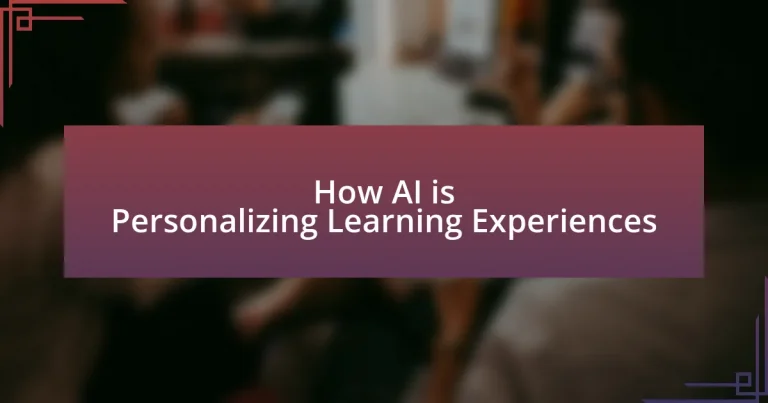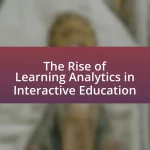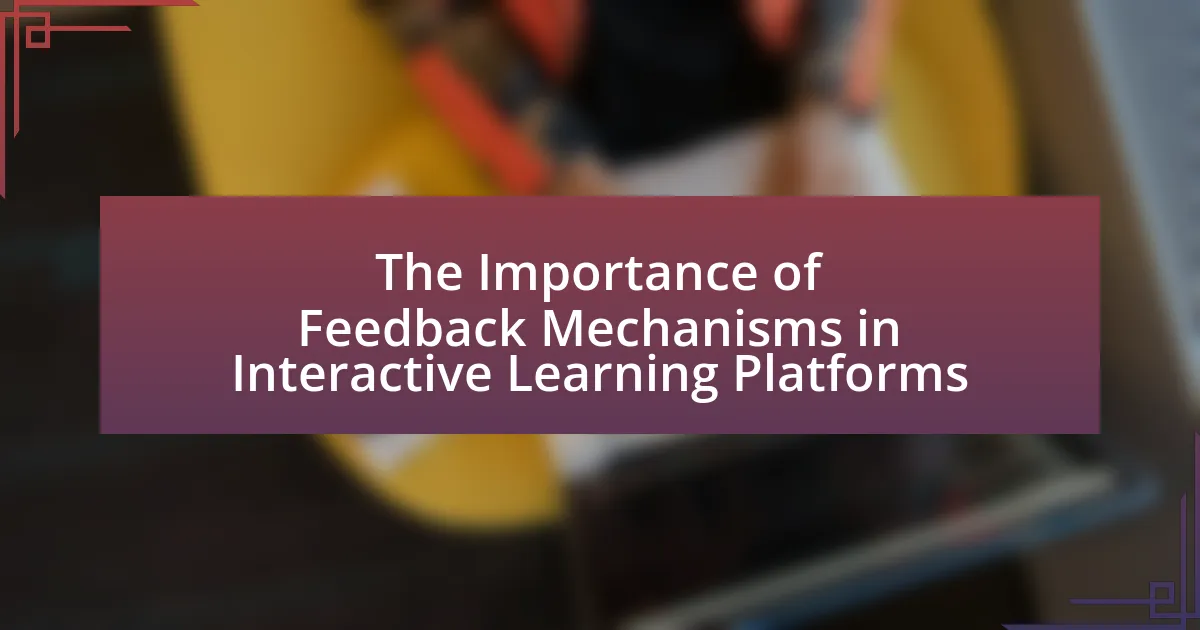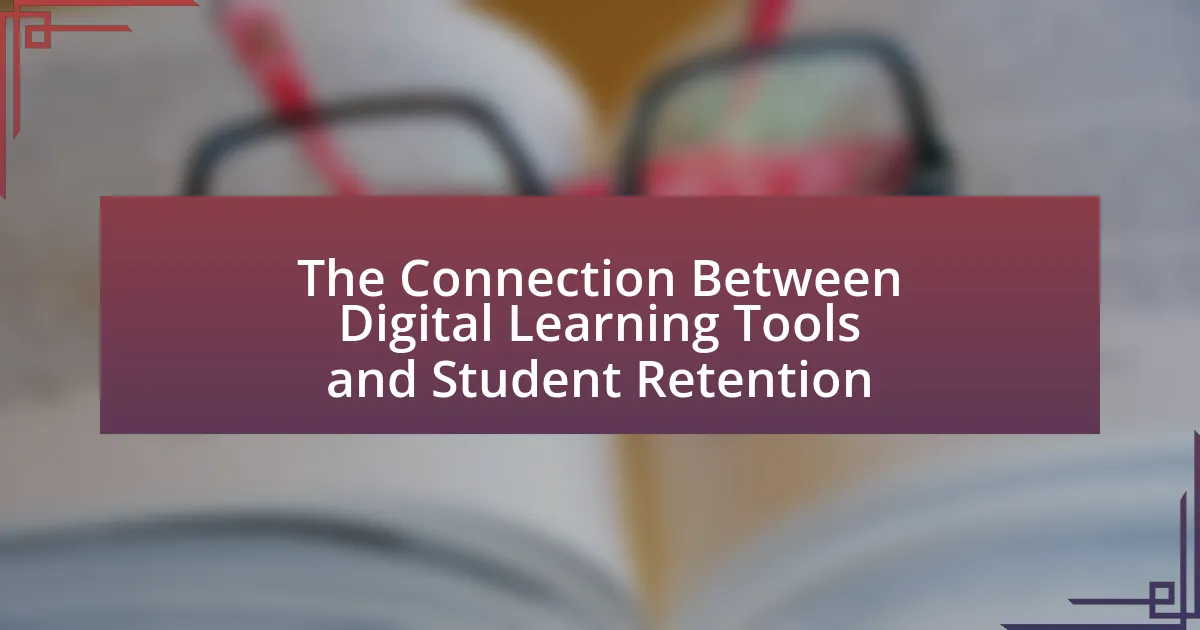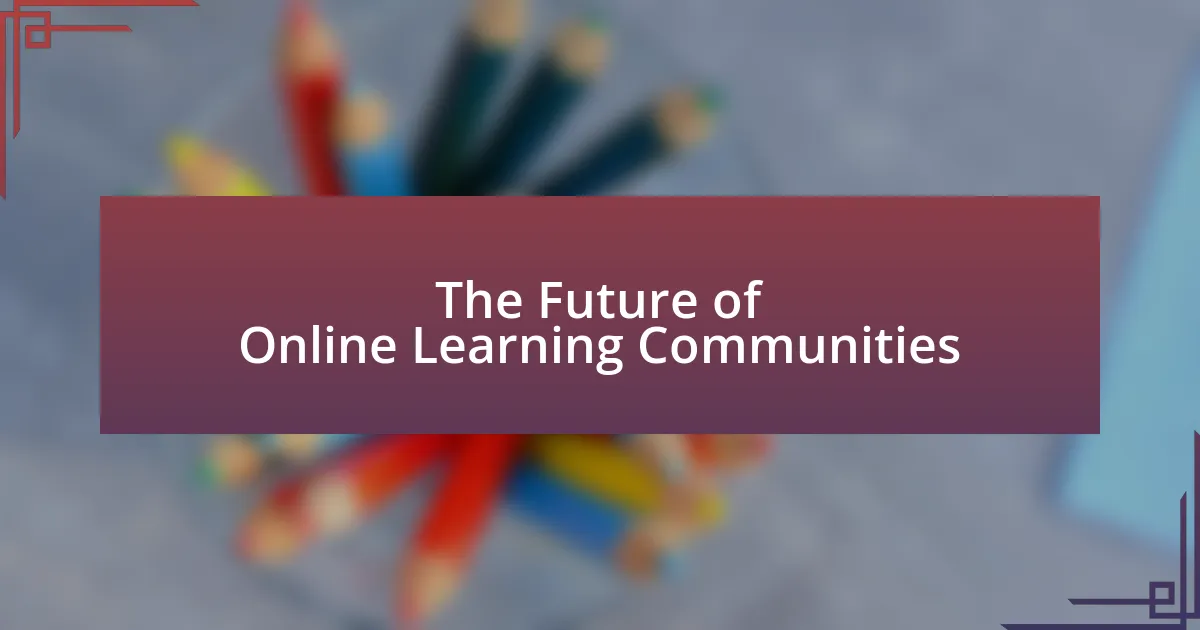The article focuses on how artificial intelligence (AI) is personalizing learning experiences by analyzing individual student data to create tailored educational content and pacing. Key technologies such as machine learning, natural language processing, and adaptive learning systems are explored, highlighting their roles in enhancing engagement and improving learning outcomes. The article discusses the importance of personalization in education, its impact on student engagement and performance, and the challenges and ethical considerations associated with implementing AI in educational settings. Additionally, it outlines future trends and best practices for educators integrating AI into learning environments.
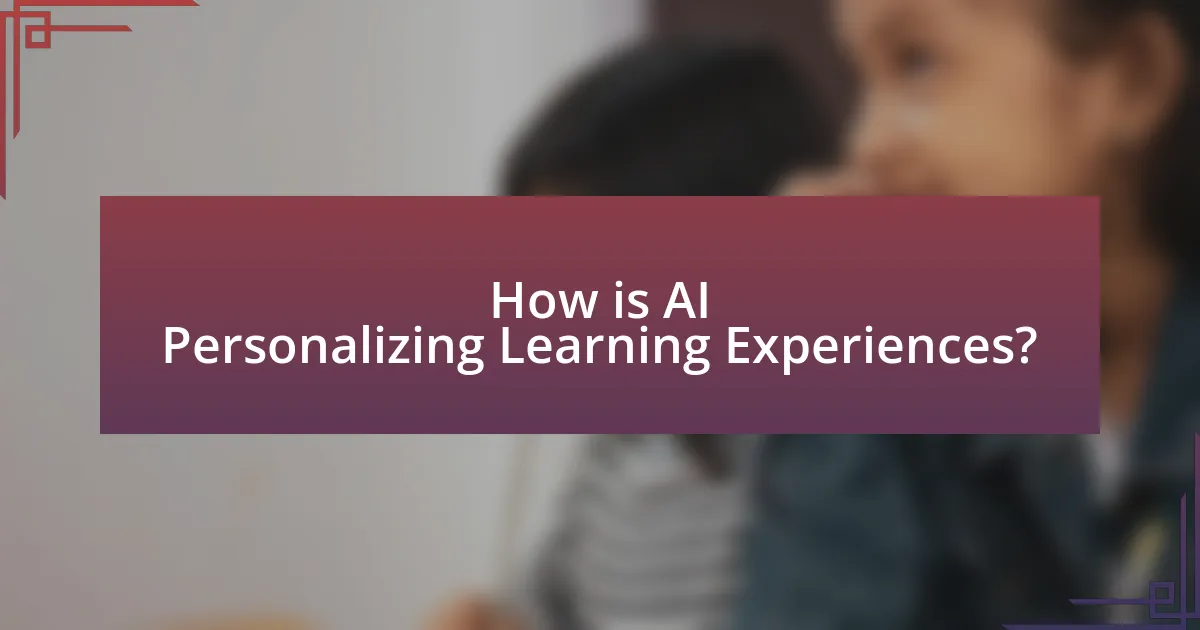
How is AI Personalizing Learning Experiences?
AI personalizes learning experiences by analyzing individual student data to tailor educational content and pacing. This adaptive learning approach utilizes algorithms to assess a learner’s strengths, weaknesses, and preferences, enabling customized lesson plans that enhance engagement and retention. For instance, platforms like DreamBox and Knewton employ AI to adjust difficulty levels in real-time based on student performance, leading to improved learning outcomes. Research indicates that personalized learning can increase student achievement by up to 30%, demonstrating the effectiveness of AI in creating tailored educational experiences.
What are the key technologies behind AI in education?
The key technologies behind AI in education include machine learning, natural language processing, and adaptive learning systems. Machine learning algorithms analyze student data to identify patterns and personalize learning experiences, enhancing engagement and effectiveness. Natural language processing enables AI systems to understand and respond to student inquiries in real-time, facilitating interactive learning environments. Adaptive learning systems adjust content and assessments based on individual student performance, ensuring tailored educational pathways. These technologies collectively contribute to a more personalized and efficient learning experience, as evidenced by studies showing improved student outcomes in AI-enhanced educational settings.
How do machine learning algorithms contribute to personalized learning?
Machine learning algorithms contribute to personalized learning by analyzing individual student data to tailor educational experiences. These algorithms assess learning patterns, preferences, and performance metrics, enabling the creation of customized learning paths that adapt in real-time to each student’s needs. For instance, a study by the Bill & Melinda Gates Foundation found that adaptive learning technologies, powered by machine learning, can improve student engagement and outcomes by providing targeted resources and feedback. This data-driven approach ensures that educational content is relevant and effective, ultimately enhancing the learning experience for each student.
What role does natural language processing play in AI-driven education?
Natural language processing (NLP) plays a crucial role in AI-driven education by enabling personalized learning experiences through the analysis and understanding of student interactions. NLP technologies facilitate real-time feedback, adaptive learning pathways, and enhanced communication between students and educational platforms. For instance, systems like intelligent tutoring systems utilize NLP to assess student responses, identify learning gaps, and tailor content accordingly, thereby improving engagement and comprehension. Research indicates that NLP applications in education can lead to a 30% increase in student performance by providing customized resources and support based on individual learning styles and needs.
Why is personalization important in learning?
Personalization is important in learning because it enhances engagement and improves educational outcomes. Tailoring educational experiences to individual needs allows learners to progress at their own pace, which has been shown to increase motivation and retention. Research indicates that personalized learning can lead to a 30% increase in student performance, as evidenced by a study from the Bill & Melinda Gates Foundation, which found that personalized approaches significantly boost achievement levels compared to traditional methods.
How does personalized learning improve student engagement?
Personalized learning improves student engagement by tailoring educational experiences to individual learning styles, interests, and paces. This customization fosters a sense of ownership and relevance in students, making them more invested in their learning process. Research indicates that students in personalized learning environments show increased motivation and participation; for instance, a study by the Bill & Melinda Gates Foundation found that personalized learning can lead to a 20% increase in student engagement metrics. By addressing the unique needs of each learner, personalized learning creates a more dynamic and interactive educational experience, ultimately enhancing student involvement and achievement.
What impact does personalization have on learning outcomes?
Personalization significantly enhances learning outcomes by tailoring educational experiences to individual student needs, preferences, and learning styles. Research indicates that personalized learning can lead to improved engagement, higher retention rates, and better academic performance. For instance, a study published in the “Journal of Educational Psychology” found that students who experienced personalized learning environments scored 20% higher on assessments compared to those in traditional settings. This demonstrates that personalization not only fosters a deeper understanding of material but also motivates learners to take ownership of their education.
What are the challenges of implementing AI in personalized learning?
The challenges of implementing AI in personalized learning include data privacy concerns, the need for high-quality data, and the complexity of integrating AI systems into existing educational frameworks. Data privacy concerns arise from the collection and use of sensitive student information, which can lead to ethical dilemmas and regulatory compliance issues. The need for high-quality data is critical, as AI algorithms require accurate and comprehensive datasets to function effectively; without this, the personalization efforts may be ineffective or biased. Additionally, the complexity of integrating AI systems into existing educational frameworks can create resistance from educators and institutions, as they may lack the necessary infrastructure or training to utilize these technologies effectively.
What ethical considerations arise with AI in education?
Ethical considerations that arise with AI in education include data privacy, algorithmic bias, and the potential for unequal access to resources. Data privacy concerns stem from the collection and use of personal information from students, which can lead to unauthorized access or misuse. Algorithmic bias occurs when AI systems reflect or amplify existing prejudices, potentially disadvantaging certain groups of students. Additionally, unequal access to AI technologies can exacerbate educational disparities, as not all students may have the same opportunities to benefit from personalized learning experiences. These issues highlight the need for ethical frameworks and guidelines to ensure that AI is implemented responsibly in educational settings.
How can data privacy concerns be addressed in AI-driven learning?
Data privacy concerns in AI-driven learning can be addressed through robust data governance frameworks, including data anonymization, encryption, and strict access controls. Implementing these measures ensures that personal information is protected while still allowing AI systems to analyze data for personalized learning experiences. For instance, anonymization techniques can remove identifiable information from datasets, thereby reducing the risk of privacy breaches. Additionally, encryption safeguards data during transmission and storage, making it inaccessible to unauthorized users. According to a report by the International Association for Privacy Professionals, organizations that adopt comprehensive data protection strategies can significantly mitigate risks associated with data privacy in educational technologies.
How does AI adapt to individual learning styles?
AI adapts to individual learning styles by utilizing algorithms that analyze user interactions, preferences, and performance data. These algorithms can identify patterns in how learners engage with content, such as their preferred modes of learning—visual, auditory, or kinesthetic. For instance, platforms like DreamBox Learning and Knewton employ adaptive learning technologies that adjust the difficulty and type of content presented based on real-time assessments of a learner’s understanding and progress. Research indicates that personalized learning approaches can lead to improved educational outcomes, as evidenced by a study published in the Journal of Educational Psychology, which found that students using adaptive learning systems showed a 20% increase in retention rates compared to traditional methods.
What methods does AI use to assess learning preferences?
AI uses various methods to assess learning preferences, including data analytics, machine learning algorithms, and user feedback mechanisms. Data analytics involves collecting and analyzing user interaction data to identify patterns in learning behaviors, such as preferred content types and engagement levels. Machine learning algorithms can then process this data to categorize learners into different profiles based on their preferences, enabling personalized learning pathways. Additionally, user feedback mechanisms, such as surveys and quizzes, allow learners to express their preferences directly, which AI systems can incorporate to refine their assessments. These methods collectively enhance the ability of AI to tailor educational experiences to individual needs, thereby improving learning outcomes.
How does AI modify content delivery based on learner feedback?
AI modifies content delivery based on learner feedback by analyzing data from user interactions to tailor educational materials to individual needs. For instance, AI systems can track which topics learners struggle with and adjust the difficulty level or provide additional resources accordingly. Research shows that personalized learning approaches, facilitated by AI, can lead to a 30% increase in learner engagement and retention rates, as evidenced by studies conducted by the Bill & Melinda Gates Foundation. This data-driven adaptation ensures that content remains relevant and effective, enhancing the overall learning experience.
What are the future trends in AI and personalized learning?
Future trends in AI and personalized learning include the increased use of adaptive learning technologies, which tailor educational content to individual student needs based on real-time data analysis. These technologies leverage machine learning algorithms to assess a learner’s strengths and weaknesses, enabling customized learning paths that enhance engagement and retention. For instance, a report by McKinsey & Company highlights that personalized learning can improve student outcomes by up to 30%. Additionally, the integration of AI-driven analytics will facilitate predictive modeling, allowing educators to anticipate student challenges and intervene proactively. This trend is supported by research from the Bill & Melinda Gates Foundation, which indicates that data-informed decision-making in education significantly boosts student performance.
How might AI evolve to further enhance personalized education?
AI might evolve to further enhance personalized education by integrating advanced algorithms that analyze individual learning patterns and preferences in real-time. These algorithms can adapt educational content dynamically, ensuring that each learner receives tailored resources that match their unique needs. For instance, AI systems can utilize data from assessments and engagement metrics to modify lesson plans, thereby improving student outcomes. Research indicates that personalized learning approaches can lead to a 30% increase in student performance, demonstrating the effectiveness of AI-driven customization in educational settings.
What innovations are on the horizon for AI in learning environments?
Innovations on the horizon for AI in learning environments include adaptive learning technologies, AI-driven tutoring systems, and enhanced data analytics for personalized education. Adaptive learning technologies utilize algorithms to tailor educational content to individual student needs, improving engagement and retention. AI-driven tutoring systems provide real-time feedback and support, allowing for a more interactive learning experience. Enhanced data analytics enable educators to track student progress and identify learning gaps, facilitating targeted interventions. These advancements are supported by research indicating that personalized learning approaches can significantly improve student outcomes, as evidenced by studies showing a 30% increase in student performance in adaptive learning environments.
What best practices should educators follow when integrating AI into learning?
Educators should prioritize transparency, data privacy, and continuous professional development when integrating AI into learning. Transparency involves clearly communicating how AI tools function and their impact on student learning, which fosters trust among students and parents. Data privacy is crucial; educators must ensure that student data is protected and used ethically, adhering to regulations like FERPA. Continuous professional development enables educators to stay updated on AI advancements and effectively implement these technologies in their teaching practices. Research indicates that schools that prioritize these best practices see improved student engagement and learning outcomes, as evidenced by a study from the Brookings Institution, which highlights the importance of ethical AI use in education.
